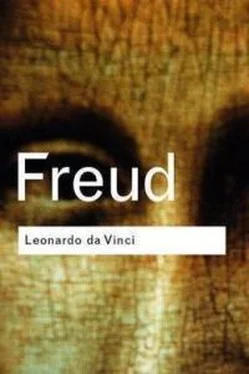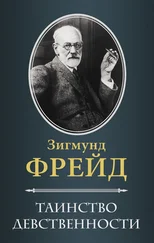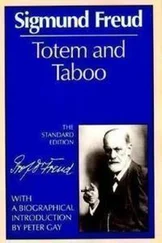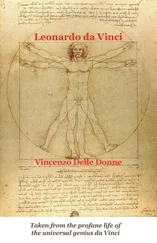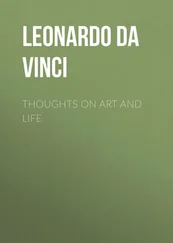However, if the imitation of his father hurt him as an artist, his resistance against the father was the infantile determinant of his perhaps equally vast accomplishment as an artist. According to Merejkowski's beautiful comparison he was like a man who awoke too early in the darkness, while the others were all still asleep. He dared utter this bold principle which contains the justification for all independent investigation: "Chi dispute allegando l'autorità non adopra l'ingegno ma piuttosto la memoria" (Whoever refers to authorities in disputing ideas, works with his memory rather than with his reason). [69] Solmi, Conf. fior, p. 13.
Thus he became the first modern natural philosopher, and his courage was rewarded by an abundance of cognitions and suggestions; since the Greek period he was the first to investigate the secrets of nature, relying entirely on his observation and his own judgment. But when he learned to depreciate authority and to reject the imitation of the "ancients" and constantly pointed to the study of nature as the source of all wisdom, he only repeated in the highest sublimation attainable to man, which had already obtruded itself on the little boy who surveyed the world with wonder. To retranslate the scientific abstractions into concrete individual experiences, we would say that the "ancients" and authority only corresponded to the father, and nature again became the tender mother who nourished him. While in most human beings to–day, as in primitive times, the need for a support of some authority is so imperative that their world becomes shaky when their authority is menaced, Leonardo alone was able to exist without such support; but that would not have been possible had he not been deprived of his father in the first years of his life. The boldness and independence of his later scientific investigation presupposes that his infantile sexual investigation was not inhibited by his father, and this same spirit of scientific independence was continued by his withdrawing from sex.
If any one like Leonardo escapes in his childhood his father's intimidation and later throws off the shackles of authority in his scientific investigation, it would be in gross contradiction to our expectation if we found that this same man remained a believer and unable to withdraw from dogmatic religion. Psychoanalysis has taught us the intimate connection between the father complex and belief in God, and daily demonstrates to us how youthful persons lose their religious belief as soon as the authority of the father breaks down. In the parental complex we thus recognize the roots of religious need; the almighty, just God, and kindly nature appear to us as grand sublimations of father and mother, or rather as revivals and restorations of the infantile conceptions of both parents. Religiousness is biologically traced to the long period of helplessness and need of help of the little child. When the child grows up and realizes his loneliness and weakness in the presence of the great forces of life, he perceives his condition as in childhood and seeks to disavow his despair through a regressive revival of the protecting forces of childhood.
It does not seem that Leonardo's life disproves this conception of religious belief. Accusations charging him with irreligiousness, which in those times was equivalent to renouncing Christianity, were brought against him already in his lifetime, and were clearly described in the first biography given by Vasari. [70] Müntz, l. c., La Religion de Leonardo, p. 292, etc.
In the second edition of his Vite (1568) Vasari left out this observation. In view of the extraordinary sensitiveness of his age in matters of religion it is perfectly comprehensible to us why Leonardo refrained from directly expressing his position to Christianity in his notes. As investigator he did not permit himself to be misled by the account of the creation of the holy scriptures; for instance, he disputed the possibility of a universal flood, and in geology he was as unscrupulous in calculating with hundred thousands of years as modern investigators.
Among his "prophecies" one finds some things that would perforce offend the sensitive feelings of a religious Christian, e.g. Praying to the images of Saints, reads as follows: [71] Herzfeld, p. 292.
"People talk to people who perceive nothing, who have open eyes and see nothing; they shall talk to them and receive no answer; they shall adore those who have ears and hear nothing; they shall burn lamps for those who do not see."
Or: Concerning mourning on Good Friday (p. 297):
"In all parts of Europe great peoples will bewail the death of one man who died in the Orient."
It was asserted of Leonardo's art that he took away the last remnant of religious attachment from the holy figures and put them into human form in order to depict in them great and beautiful human feelings. Muther praises him for having overcome the feeling of decadence, and for having returned to man the right of sensuality and pleasurable enjoyment. The notices which show Leonardo absorbed in fathoming the great riddles of nature do not lack any expressions of admiration for the creator, the last cause of all these wonderful secrets, but nothing indicates that he wished to hold any personal relation to this divine force. The sentences which contain the deep wisdom of his last years breathe the resignation of the man who subjects himself to the laws of nature and expects no alleviation from the kindness or grace of God. There is hardly any doubt that Leonardo had vanquished dogmatic as well as personal religion, and through his work of investigation he had withdrawn far from the world aspect of the religious Christian.
From our views mentioned before in the development of the infantile psychic life, it becomes clear that also Leonardo's first investigations in childhood occupied themselves with the problems of sexuality. But he himself betrays it to us through a transparent veil, in that he connects his impulse to investigate with the vulture phantasy, and in emphasizing the problem of the flight of the bird as one whose elaboration devolved upon him through special concatenations of fate. A very obscure as well as a prophetically sounding passage in his notes dealing with the flight of the bird demonstrates in the nicest way with how much affective interest he clung to the wish that he himself should be able to imitate, the art of flying: "The human bird shall take his first flight, filling the world with amazement, all writings with his fame, and bringing eternal glory to the nest whence he sprang." He probably hoped that he himself would sometimes be able to fly, and we know from the wish fulfilling dreams of people what bliss one expects from the fulfillment of this hope.
But why do so many people dream that they are able to fly? Psychoanalysis answers this question by stating that to fly or to be a bird in the dream is only a concealment of another wish, to the recognition of which one can reach by more than one linguistic or objective bridge. When the inquisitive child is told that a big bird like the stork brings the little children, when the ancients have formed the phallus winged, when the popular designation of the sexual activity of man is expressed in German by the word "to bird" (vögeln), when the male member is directly called l'uccello (bird) by the Italians, all these facts are only small fragments from a large collection which teaches us that the wish to be able to fly signifies in the dream nothing more or less than the longing for the ability of sexual accomplishment. This is an early infantile wish. When the grown–up recalls his childhood it appears to him as a happy time in which one is happy for the moment and looks to the future without any wishes, it is for this reason that he envies children. But if children themselves could inform us about it they would probably give different reports. It seems that childhood is not that blissful Idyl into which we later distort it, that on the contrary children are lashed through the years of childhood by the wish to become big, and to imitate the grown ups. This wish instigates all their playing. If in the course of their sexual investigation children feel that the grown up knows something wonderful in the mysterious and yet so important realm, what they are prohibited from knowing or doing, they are seized with a violent wish to know it, and dream of it in the form of flying, or prepare this disguise of the wish for their later flying dreams. Thus aviation, which has attained its aim in our times, has also its infantile erotic roots.
Читать дальше
